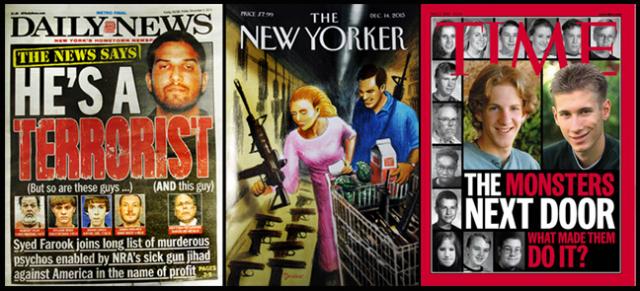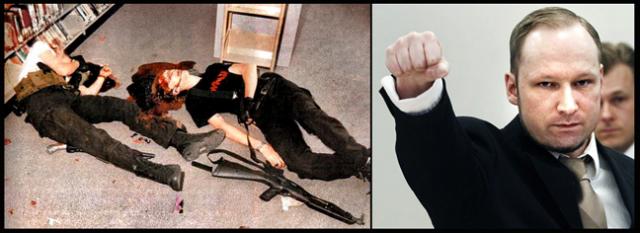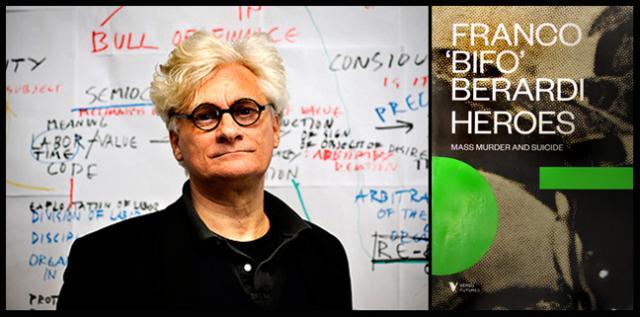Give me an adequate army, with power to provide it with more pay and better food than falls to the lot of the average man, and I will undertake, within 30 years, to make the majority of the population believe that two and two are three, that water freezes when it gets hot and boils when it gets cold, or any other nonsense that might seem to serve the interest of the state.
- Bertrand Russell
An epidemic of unhappiness is spreading across the planet, while capital absolutism is asserting its right to unfettered control of our lives.
- Franco “Bifo” Berardi
First there was Paris. Then Colorado Springs. Then San Bernadino. A great discussion was raised in the land over which of the killers were terrorists and which were just lunatics. Police and FBI frantically went through apartments, hard-drives and cellphones to find out who had radicalized whom. Well paid corporate TV anchors salivated as police cordoned off crime scenes and politicos huddled in secret situation rooms to get their stories straight so they could release an official story to an eager and fearful public. They no doubt kept many important details to themselves.
 Media covers focused on America's problem with murder/suicide
Media covers focused on America's problem with murder/suicide
Beyond the radicalizing question, there isn’t much interest why these people — versus other people — did what they did. Motivation comes down to: Who made them do it? The words alienation and despair are rarely seen, except maybe in the marginalized columns of the left. The problems of alienation and despair disappeared from the national discussion about the time Jimmy Carter’s malaise was overwhelmed by Ronald Reagan’s shining city on a hill and the rigors of 21st century “neoliberal” financial capitalism took the driver’s seat in America.
The Right emphatically pointed at ISIS and the Muslim threat. Utilizing sophisticated social media skills, a monstrous, growing caliphate had declared war on America and was seducing people living among us to kill us. America needed to respond with unrestrained lethal force, so America could be great again. In cases like the Planned Parenthood killings and the Charleston killings, the Left pointed at rightwing media bullhorns like Bill O’Reilly for relentlessly demonizing Planned Parenthood and the Black Lives Matters movement. O’Reilly vociferously denied on-air that he had “radicalized” anyone; he was not responsible for armed lunatics. The National Rifle Association stood firm: Any controls on citizen access to military assault rifles was the work of the Devil.
At last count, rightwing, domestic terror accounted for slightly more deaths than Islamic jihad terror; it was close enough that The New York Times called it a draw. Meanwhile, 200,000 Americans died on US highways, obesity grew, heroin slipped into the white, suburban community, our bridges were deteriorating, our regimented education system avoided teaching critical thinking skills like the plague and the weather kept getting stranger and stranger. A mixture of fear and a sense of the absurdity of it all made many Americans want to run screaming into the night.
Thanks to what officials called the “perplexing” quality of the San Bernadino case (it seemed a hybrid of Islamic- and workplace-terror), the polarizing issue of who is and who isn’t a terrorist was finally put to rest. Officialdom designated a distinction between Islamic terrorism and domestic terrorism. But in the end, the discussion was moot, thanks to the roller-coaster carnival of the 2016 presidential campaign. The sitting Democratic president continued with bombing and a minimum of US troops on the ground to counter ISIS. He did seem reluctant to stir up World War Three. The most rabid Republican candidates, led by Donald Trump did not share this restraint. Trump wanted to “bomb the shit out of ISIS” and suggested the President was a fifth columnist working for Islam inside the White House. He cited FDR’s Japanese internment camps as precedent for barring all Muslims from entering the country. Not to be outdone, Ted Cruz declared, “I want to carpet bomb ISIS.” The last time the US did that was with B-52s over Laos, something all civilized humans agree was a war crime.
The food fight didn’t stop smart, resourceful reporters like Lydia Wilson from traveling to Kirkuk in Iraq and, along with a retired US general named Doug Stone, actually interviewing a number of captured ISIS soldiers face-to-face. An article was published, as one might expect, in a left-leaning publication, The Nation. One 26-year-old ISIS fighter with a sixth-grade education and two kids to support told her he was fed up with war and ISIS. He had apparently participated in some killing, but still, he seemed more a pathetic individual trapped by evil circumstances than the bloody-fanged monster we’ve been led to envision. After the interview, the man was asked if he had anything he wanted to say. He told Wilson and Stone this: “The Americans came. They took away Saddam, but they also took away our security. I didn’t like Saddam. We were starving then, but at least we didn’t have war. When you came here, the civil war started.”
“[This young man] fits the absolutely typical profile,” General Stone told Wilson. “The average age of all the prisoners in Iraq when I was here was 27; they were married; they had two children; had got to sixth to eighth grade. He has exactly the same profile as 80 percent of the prisoners then … and his number-one complaint about the security and against all American forces was the exact same complaint from every single detainee.”
This young father is a perfect example of human despair at the end of its rope in a thoroughly destroyed cultural space, in this case, the Saddam-friendly Sunni lands of Anbar Province in western Iraq.
Thomas Ricks wrote a book on the Iraq War in 2006 called Fiasco: The American Military Adventure in Iraq. He published another book in 2009 called The Gamble: General David Petraeus and the American Military Adventure in Iraq, 2006-2008. He ended the second book this way: “No matter how the US war in Iraq ends, it appears that today we may be only halfway through it. … In other words, the events for which the Iraq War will be remembered probably have not yet happened.”
It’s now seven years later. As he campaigned he would do, President Obama pulled US troops out of Iraq. That’s as it should be. But the people who lived there were left with a thoroughly battered living space, physically and culturally. They were now ruled by a Shiite government installed by our invasion, leaders who hated them and wanted vengeance on them. As Rick put it, halftime is over and we’re now in the beginning of the second half of what was, of course, a totally unnecessary war-of-choice started by George W. Bush, Dick Cheney and Donald Rumsfeld.
 Busy Baghdad street and explosion, January 2004 (John Grant)
Busy Baghdad street and explosion, January 2004 (John Grant)
By SUV, I traveled four times, 12-hours each time, across the barren expanse of Anbar Province. We stopped at truck stops and little shops in tiny villages along the way; I took the opportunity to communicated as best I could with as many people as I could. In January 2004, I was shooting video for a documentary film in Baghdad. I will never forget the strapping Iraqi man in his 40s who accompanied me as I shot in a bombed out university building. At one point, in a friendly, patronizing tone, he said, “John, you know all Iraqis will lie to you.” The way he said it was like he was explaining gravity, as if he was saying, you Americans don’t get it: Over the decades of colonial occupation, the years ruled by the gangster Saddam, the ravages of the Gulf War and the cruel embargo that followed, the 2003 “shock and awe” invasion and the imperial occupation, Iraqis have been crushed to the point decency and honesty is gone. All that counted was what you could get away with to survive. As I recall those days, I’m not shocked in the least that Anbar Province has been taken over by people consumed with psychopathic vengeance where the US is the enemy. The levels of despair we helped instill in a huge, desolate piece of real estate must be incredible.
“What the world ultimately thinks about us and what we think of ourselves,” Ricks quotes US Ambassador to Iraq Ryan Crocker saying in 2008, “is going to be determined much more by what happens from now on than what’s happened up to now.”
Some Insightful Radical Thinking
I’m a devoted scourer of thrift shop book shelves. I love looking through the books that people have discarded. Much of it is pop trash, but there’s always that gem or a handful of books that capture my interest for some reason. Thrift shops are the antithesis of fashion, so the books one finds there are often focused on dated ideas or stories.
Such was the case with The Cold Fire: Alienation and the Myth of Culture, a small book published in 1976 by two psychiatry professors, Stanley Rosenberg and Bernard Bergen. It’s very much a book of the mid-seventies, steeped in existentialism and the spirit of reform and protest. The writers drop quotes from Soren Kierkegaard and Friedrich Nietzsche; they discuss classic novels of alienation popular then, like Joseph Heller’s Catch-22, Ralph Ellison’s The Invisible Man and Saul Bellow’s Herzog; they discuss iconic personalities like Bob Dylan, Eldridge Cleaver and Abbie Hoffman. In 1976, alienation was still a popular topic; it was a positive contribution to discussions of the day. The Eisenhower fifties were past; John Kennedy was dead; the civil rights movement had reached a plateau after being linked with the Vietnam War, which had now become a refugee problem. The idealism of the early sixties was gone, but it was still a time of upheaval; in 1976, people were still asking questions. It made perfect sense, as Rosenberg and Bergen do, to psychologically examine the topic of alienation from a culture and what that alienation said about culture as the sum of human interactions.
“The alienated position consequently involves a sense of despair over the self … and over its inability to break out of bad faith,” they write. “In these moments the actions that have constituted much of one’s being in the world come to look absurd. This sense of absurdity also reveals to the self the madness of a culture which dictates that the self play out such bad faith. And once alienated, the self can see culture only as a continual, pointless violence.” For the bombardier Yossarian in Catch-22, “Alienation was, in fact, presented as the only stance a sane man could assume in a system that made no sense.”
As a recalcitrant teenager, I picked up a blue paperback copy of Catch-22 at Grandpa’s Trading Post on US-1 in Homestead, Florida, where I lived. The nostalgia for reading that novel as a kid in 1965 is strong. I read the novel next at a firebase in the forests near the Cambodian border where we were periodically mortared by the North Vietnamese troops I was trying to locate with my direction finder radio. I finally I read it as a literature student on the GI Bill at Florida State University where I learned that the 1955 novel was not only inspired by experiences in World War Two, but also by Heller’s time after the war working in the New York corporate world of advertising. You might say I was “radicalized” by Joseph Heller.
“There was only one catch and that catch was Catch-22, which specified that a concern for one’s safety in the face of dangers that were real and immediate was the process of a rational mind. Orr was crazy and could be grounded. All he had to do was ask; and as soon as he did, he was no longer crazy and would have to fly more missions.”
Any serious discussion of alienation and absurdity like this has been purged from the mainstream media and from our minds. The purge began in the late 1970s when technological innovation began to hit its stride and the American political right began its ascendancy. It has now reached a pinnacle of sorts with the nativist (some would say quite absurd and alienating) ravings of Donald Trump. As the right ascended, it dragged most Democrats along as opportunists and money-addicted hacks. Today, if you raise the idea of alienation from the culture we live in — one of militarized/financialized/consumer capitalism — you’re assumed to be a loser or a subversive.
What I am is a radical-pragmatist. I’m a radical in the sense of my Webster dictionary’s primary definition: “Of or going to the root or origin.” Our National Security State and our mainstream Media tend to employ the ninth definition in my Webster: “A person who holds or follows strong convictions or extreme principles; extremist.” Shooting people down in a conference hall is the act of an “extremist” — not that of a “radical.” I add pragmatist to the mix because I will dialogue with anyone and I accept compromise as the way of the world. I’m not a pacifist, but it seems to me radicals are generally not the ones initiating violence in this world.
The other day I picked up a book hot off the presses that I consider the heavy artillery on alienation and despair in today’s dangerous world. It’s called Heroes: Mass Murder and Suicide by an Italian who writes in English, Franco “Bifo” Berardi. He’s a radical in the best sense of the word, and yes, he’s a leftist who has no doubt read his Marx, though Berardi’s writing is not focused on economic analysis but on culture, psychology and communications: How culture is formed by language out of chaos; how minds are influenced and deluded; how we so readily shut out or forget inconvenient truths; how individuals can be consumed by culture. Berardi is as lucid and as witty a writer as Bertrand Russell was back in 1950 when he wrote, in the epigram above, about the “nonsense” a National Security State tends to dish out.
“Why did I write such a horrible book?” Berardi asks himself. Starting in 2012, he began researching a host of international mass murders and suicides. The vision he sketches out is, indeed, quite “horrible,” and the bad-guy tends to be the so-called neoliberal, free-market capitalist obsession with productivity and the demoralizing effects it has on many people around the world. When a person becomes so alienated and reaches a condition of such despair — no matter where he or she lives — murder and/or suicide become real options. Berardi writes about incredible suicide rates among farmers in India in response to Monsanto’s monopoly control of seed production that has devastated their traditional, subsistence-based lives. Suicide is seen as a last-ditch effort at dignity and identity among workers of a massive Foxconn electronics plant in Shenzhen, China, where popular Apple iPhones and iPads are made. (Foxconn is owned by Hon Hai Precision Industry headquartered in Taiwan.) Foxconn’s 400,000 employees are heavily controlled by security. Skirts made of three million square meters of netting were put around dormitories to catch suicide jumpers. In one case, several young workers rigged up bombs that killed themselves and burned down major buildings in the complex. Berardi links this with today’s youthful pop obsession with zombies, which were mythically rooted in brutal Haitian slave culture. According to Amy Wilentz, “Suicide was the slave’s only way to take control over his or her own body.” The zombie is a case of a incomplete-death — the walking dead. For Haitian slaves, becoming a zombie constituted a failure to fully escape the hell of the plantations, since many slaves came to associate death with a comforting return to the motherland. Slave owners saw suicide as theft of labor, Wilentz says. The zombie was “the scarecrow keeping slaves from killing themselves.” Overall, Berardi sees more similarities than differences among mass suicides, angry Arab Muslim terrorists, a right-wing mass killer in Norway and a couple of bullied kids in Columbine.
 An Indian farmer in the age of Monsanto, the Foxconn factory and a worker on the edge
An Indian farmer in the age of Monsanto, the Foxconn factory and a worker on the edge
The point is there’s a cause and effect relationship going on here that our National Security State and Mainstream Media refuse to recognize or discuss seriously. Why? Because it’s uncomfortable and critical of a culture that self-promotes itself as “exceptional.” Like George W. Bush or Donald Trump, America can do no wrong; regrets or apologies are never in our quiver of options. Since the days of Jimmy Carter’s malaise speech the forces of expansionism and repression have reacted harshly against suggestions there’s anything unhealthy about the engine that drives America’s success in the world. In fact, the vicious backlash against President Barack Obama makes sense if his presidency is seen (as many on the right do) as a re-run of Jimmy Carter’s focus on dignity and decency. In that sense, Trump’s bumper sticker line — “Make America Great Again” — is an echo in a much more cynical and dangerous time of the entertainer Ronald Reagan’s 1980 campaign.
Despairing Humans Running Amok
“We are breeding a generation of human beings whose primal impressions come from a machine — it’s the first time in history this has occurred.” Rose Goldstein wrote this in The Show and Tell Machine forty years ago. Berardi sees this today as flat-out “mass psychopathology” that is having profound effects on how young people learn language and interrelate. Culture is an entirely random creation rooted in the signs and symbols of language, and in an information-based culture like ours this trumps economics, which is why it interests thinkers like Berardi. When culture and lived experience become for kids “virtual,” when living “on-line” is more important than person-to-person living, empathy becomes a lost art. Empathy, Berardi says, “is not a natural emotion, but rather a psychological condition that is cultivated and refined, and which, in the absence of such cultivation, can wither and disappear.”
Something like this was the case with Eric Harris and Dylan Klebold, the Columbine killers. A slight youth bullied in school, Harris wanted to join the Marines but was rejected shortly before the massacre because he was taking a court-ordered anti-depressant to manage his anger. He believed in social Darwinism and wore a white t-shirt with the words “Natural Selection” on his chest the day of the massacre. He wrote in his journal, “Everyone is always making fun of me because of how I look, and how fucking weak I am and shit. …You people could have shown more respect, treated me better, asked for my knowledge or guidance more, treated me more like a senior, and maybe I wouldn’t have been as ready to tear your fucking heads off.” Klebold shared his friend’s view. Berardi sums that view up as being a “loser [who] wants to be a winner, for an hour, before a violent death.” Klebold wrote, “You’ve been giving us shit for years. You’re gonna fucking pay for all the shit! We don’t give a shit. Because we’re gonna die doing it.”
 Harris and Klebold after their suicide, and Anders Brievek in a Norwegian court
Harris and Klebold after their suicide, and Anders Brievek in a Norwegian court
Berardi sees larger political implications in this tragic scenario. “Harris and Klebold’s psychology could be synthetically described as a suicidal form of the Neoliberal will to win. In the wake of the Neoliberal proclamation of the end of class struggle, the only social categories remaining are winner and loser. … Either you are strong and smart, or you deserve your misery.”
We would expect defenders of the neoliberal free-market system to disagree. But there’s a good argument — granted one employed on the left — that the so-called neoliberal structuring of life approaches in many areas a totalitarian condition. Berardi makes that clear when he cites the despair implicit in massive, cold-blooded corporate systems that employ workers under terms he refers to as “blackmail,” where the implicit message is suffer under our slave-like work rules or leave — and starve.
He raises the term to run amok, which comes from the Malay language. My Websters defines amok as: “(among members of certain southeast Asian cultures) a psychological disturbance characterized by depression followed by a manic urge to murder.” “Running amok,” Berardi writes, “is a way of re-establishing one’s reputation as a man to be feared and respected, but is also a way of escaping the world when life has become intolerable, and generally culminates in suicide.” It reminds him of the Nike motto: Just do it!
Many of our mass murders follow this narrative logic. A male loner alienated from society and culture snaps and lethally lets loose, thanks to easy access to military weaponry. The case of Anders Brievik is different. In July 2011, he sets off a bomb in Oslo, Norway, and as the police attend to that, he moves to a small island where 650 members of the youth wing of the Norwegian Labor Party are having an annual campout. He kills 75 people and wounds 300 others before he’s stopped. Before going on his spree, Brievek wrote a lucid manifesto of sorts titled 2083: A European Declaration of Independence in which he criticizes multiculturalism “as the root cause of the ongoing Islamisation of Europe which has resulted in the ongoing colonization of Europe through demographic warfare.” He blames Marxist theorists and the Palestinian Edward Said, author of Orientalism, a classic text critical of European colonialism. According to Brievek, the 1950s were a good time when people were safe in their homes, schools were excellent, children grew up in two-parent households and entertainment was of the wholesome kind the whole family could enjoy. The left and Islam are destroying all this, and he wants to save western civilization. “What Brievik writes might be signed in full and almost without correction by the neo-conservative intellectuals and the Tea Party militants of the United States,” Berardi writes without a hint of irony.
Alienation and despair are the third rail of Muslim terrorism; no one is supposed to raise this lest they be seen as sympathetic. It’s become a bit like the McCarthy period and the avoidance of any expression possibly seen as sympathetic to communists. Defending against a terrorist act is one thing, but that in no way alters the wisdom of understanding the root causes driving terrorist acts. The choice is between being smart and human versus the need to posture as a tough guy. Being smart and human is what’s going to solve the problem.
Berardi cites a Lebanese writer named Samir Kassir, who ended up being killed by terrorists in 2005. Kassir sees “unhappiness as a fundamental motivation of Arab culture and political action. … [Kassir] identifies Arab political aggressiveness as an effect of colonial victimization and the ensuing culture of victimhood.” Berardi also quotes Fethi Benslama, a Tunisian psychologist: “Despair is not a category of political science, but the Islamic movement, particularly in its extremist version, cannot be understood if we do not understand it as the most powerful testimony of mass despair.” Berardi emphasizes “the persistent humiliation that America’s self-defeating strategy of infinite war has inflicted on the Arab people.”
To Live With Joy In a Dystopia
What makes Berardi’s book especially “horrible” is how it ends, with a chapter titled “What Should We Do When Nothing Can Be Done?” He sees no real way out using past political options. He forces himself to watch two films in the incredibly popular Hunger Games series and to read the final book in the series. In the closing chapter of a philosophical book on suicide and murder as responses to cultural alienation and despair, for him, the series “captures the mood of the wide majority of the precarious generation, which is one of an unquestioning acceptance of reality through a deep cynicism regarding the possibility of an alternative. As the only imagination of the future is dystopian, dystopia is the world that we will soon be living in.”
 Franco “Bifo” Berardi and his book, Heroes: Mass Murder and Suicide
Franco “Bifo” Berardi and his book, Heroes: Mass Murder and Suicide
He often cites the neoliberal economy as being about the “deterritorialization” of life — what some might call the breakdown of the nation-state system into a more anarchic, global distribution of power. The future he sees will be about what follows computer technology, a focus on what he calls “neuro-plasticity” or the mapping of, and struggle over, human subjectivity. The alternatives will either be “a new form of ultimate neuro-totalitarianism, or a new form of trans-human Humanism.” He’s rooting for the latter — as am I. “The main field of contention is going to be the activity of the mind.” He points out that when President Obama announced a research project called Brain Activity Mapping he called it “the main scientific investment for the next decade in the US.”
So what should we do when nothing can be done? Basically he calls for a subjective revolt — an anarchism of individual subjective thought. Think for yourself. Make art. Give up on the old, tiresome political methods and those crazy conspiracy theories. And most important: Don’t let it get you down. Live with courage and “dystopian irony.” Running amok makes no sense. “[D]espair and joy are not incompatible. Despair is a consequence of understanding. Joy is a condition of the emotional mind.”
Yeh, it’s a lot to absorb, and I have many questions. Berardi, the radical, ends with this: “Finally, don’t take me too seriously.”
